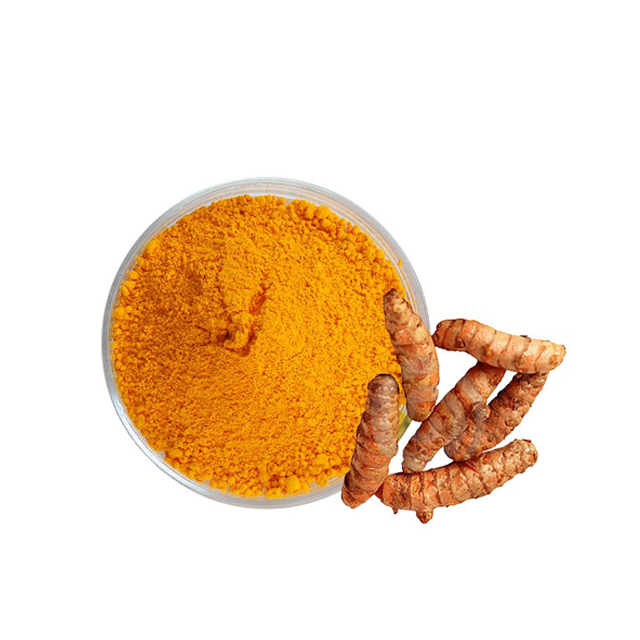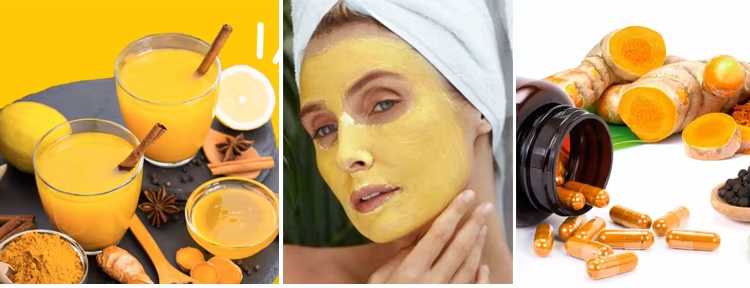What is curcumin?
Curcumin is a natural compound extracted from the rhizome of the turmeric (Curcuma longa) plant and belongs to the class of polyphenols. Turmeric is a common spice widely used in Asian cooking, especially in India and Southeast Asia. Curcumin is the main active ingredient in turmeric, giving it its characteristic yellow color.

Extraction technology of curcumin:
Raw material preparation: Select fresh turmeric rhizomes, wash them and remove impurities and dirt.
Drying: Cut the cleaned turmeric rhizomes into small pieces and dry them in the sun or in a dryer until the moisture content is reduced to a level suitable for storage.
Crushing: Crush the dried turmeric rhizomes into a fine powder to increase the surface area for the subsequent extraction process.
Solvent extraction: Extraction is performed using an appropriate solvent such as ethanol, methanol or water. Turmeric powder is mixed with a solvent and usually stirred at a certain temperature and time to dissolve the curcumin into the solvent.
Filtration: After extraction, remove the solid residue by filtration to obtain a liquid extract containing curcumin.
Concentration: The filtered liquid is concentrated by evaporation or other methods to remove excess solvent and obtain a higher concentration of curcumin extract.
Drying: Finally, the concentrated extract can be further dried to obtain curcumin powder for easy storage and use.
What does curcumin do for your body?
Antioxidant effect: Curcumin has strong antioxidant properties that can neutralize free radicals and reduce the damage of oxidative stress to cells, thereby protecting cell health.
Improves digestion: Curcumin may help improve digestion, relieve problems such as indigestion and bloating, and may have a positive impact on intestinal health.
Cardiovascular Health: Some studies have shown that curcumin may help improve cardiovascular health, lower cholesterol levels, and reduce the risk of heart disease.
Neuroprotection: Curcumin may have a protective effect on the nervous system, and studies have explored its potential application in Alzheimer’s disease and other neurodegenerative diseases.
Anti-cancer potential: Preliminary studies suggest that curcumin may have anti-cancer properties and can inhibit the growth and spread of certain cancer cells.
Improves Skin Health: Curcumin’s anti-inflammatory and antioxidant properties have made it of interest in skin care, potentially helping to improve skin conditions such as acne and skin aging.
Regulates Blood Sugar: Some studies have shown that curcumin may help improve insulin sensitivity and help regulate blood sugar levels.

Application of curcumin:
Food and Beverage: Curcumin is often used in food and beverages as a natural pigment and flavoring agent. It not only provides a bright yellow color to food, but also has certain health functions. Many curry powders, seasonings, and beverages (such as turmeric milk) contain curcumin.
Nutritional Supplements: Due to its potential health benefits, curcumin is widely used in nutritional supplements. Many health supplements use curcumin as a main ingredient and are designed to support anti-inflammatory, antioxidant and immune system health.
Drug Development: Curcumin has gained attention in drug development, and researchers are exploring its potential applications in treating a variety of diseases, such as cancer, cardiovascular disease, and neurodegenerative diseases.
Cosmetics and Skin Care: Due to its anti-inflammatory and antioxidant properties, curcumin is used in some skin care products aimed at improving skin health, slowing the aging process, and relieving acne and other skin problems.
Traditional Medicine: In traditional medicine, especially Ayurvedic medicine in India, curcumin is used to treat a variety of ailments, including digestive problems, arthritis, and skin diseases.
Agriculture: Curcumin has also been studied for use in the agricultural field as a natural pesticide and plant growth promoter to help improve the disease resistance of crops.
Food Preservation: Due to its antioxidant properties, curcumin is used as a food preservative in some cases to help extend the shelf life of food.
Contact:Tony Zhao
Mobile:+86-15291846514
WhatsApp:+86-15291846514
E-mail:sales1@xarainbow.com
Post time: Dec-12-2024

